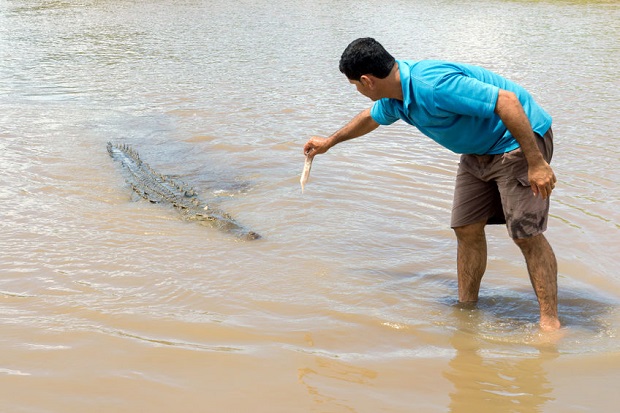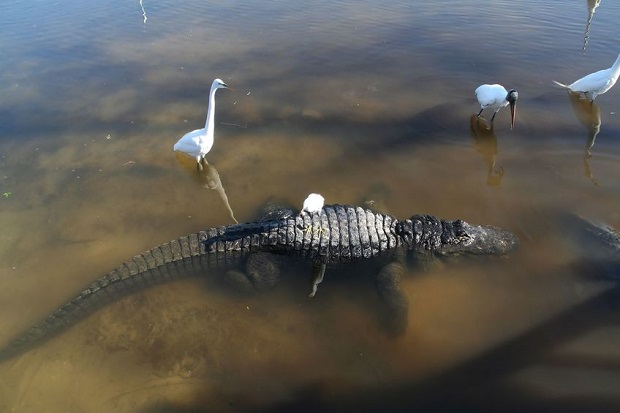What Do Alligators Eat?
Did you know that the diet of the female alligator differs from the male? Did you know that the size of the alligator makes a difference in what they eat? Discover what alligators eat and under what circumstances their diets vary.
Alligators are primarily carnivores. Their prey consists of whatever is abundant and easily accessible, ranging from amphibians and fish to birds and mammals. What an alligator chooses to eat relies heavily upon availability, vulnerability, and size of prey. The size and sex of the alligator also play a role in the alligator diet. [1]
Alligator Diet Varies with Habitat
The habitat where an alligator lives and its size are the primary determinants of what it eats.
| Location/Size | Diet |
| Florida/northern Louisiana | Fish and turtles [2] |
| Suburban areas | Domestic pets [2] |
| Rural areas | Calves, hogs, goats, and foals. [2] |
| Large alligators | Cattle and horses [2] |
| All alligators are cannibals | Fellow alligators [2] |
| 🐊Sad Reality: Up to 5% of juvenile mortality is attributed to becoming the meal of another alligator. [3]
🍽️ Alligator Diet Varies with Size
Though the alligator is an opportunist feeder, what they eat varies with their size.
- Hatchlings: rustaceans, snails, and small fish
- Subadults: crustaceans, fish, small mammals, and birds
- Mature Adults: fish, turtles, birds, and mammals. [4]
Alligator Diet Varies with Sex
A Florida study designed to determine an alligator’s eating habits examined the stomach contents of more than 350 American alligators and found that the alligator diet also seems to vary with sex. In the same populations:
- Female alligators consumed significantly more mammals
- Male alligators consumed more reptiles. [5]
Do Alligators Eat People?

Human attacks are rare, but they do happen. As mentioned, an alligator will eat anything that makes itself available. Feeding alligators is a dangerous activity that leaves humans vulnerable to attacks. An alligator will become aggressive once they associate a human with food. Swimming in areas known to have alligators puts you at extreme risk of being attacked. Anytime that humans encroach on alligator habitat increases the risk of being attacked. [6]
How Much Do Alligators Eat?

Did you know that a 100-pound dog will eat more in a year than an 800-pound alligator? [7] That’s because they are ectotherms relying on external heat sources to regulate body temperature. When the temperature drops, so do their metabolism, which means they do not require as much food energy as an endotherm. This means that an adult alligator may only need to eat a few times per week. [8]
When Do Alligators Eat?

Alligators primarily feed at dusk or during the night. Their feeding habits also depend on temperature. Because they are ectotherms, they are the most active feeders at a time of year when their metabolism is highest at temperatures between 82°F-92°F. They will generally stop feeding if the temperature drops below 70°F. [9] They will become dormant at temperatures below 55°F. [10]
How Alligators Eat
Once an alligator kills an animal for food, it usually consumes it immediately. However, if the prey is large and cannot be swallowed whole, it may be placed underwater to be eaten when the animal has rotted. An alligator’s teeth are designed to crush prey, and tearing chunks from dead animals may be difficult for these reptiles. [11]
📚References
[1] The University of Florida; Rice N. – “Diet and Condition of American Alligators in Three Central Florida Lakes.”
[2] [4] Florida Game and Fresh Water Fish Commission; Woodward A. – “Alligators: Food Habits.”
[3][5][10] Florida Game and Freshwater Fish Commission; Delany, M. – “American Alligator Food Habits in Central Florida.”
[6] Savannah River Ecology Laboratory – “Alligators Are Just Being Alligators.”
[7] Savannah River Ecology Laboratory – “American Alligator (Alligator Mississippiensis).”
[8] Texas A&M Agrilife – “Texas Parks and Wildlife: Gator Facts.”
[9] Florida Fish and Wildlife Conservation Commission – “Reptiles: Alligator: Alligator Mississippiensis.”
[11] The University of Florida-IFAS – “Living with Alligators: A Florida Reality.”
